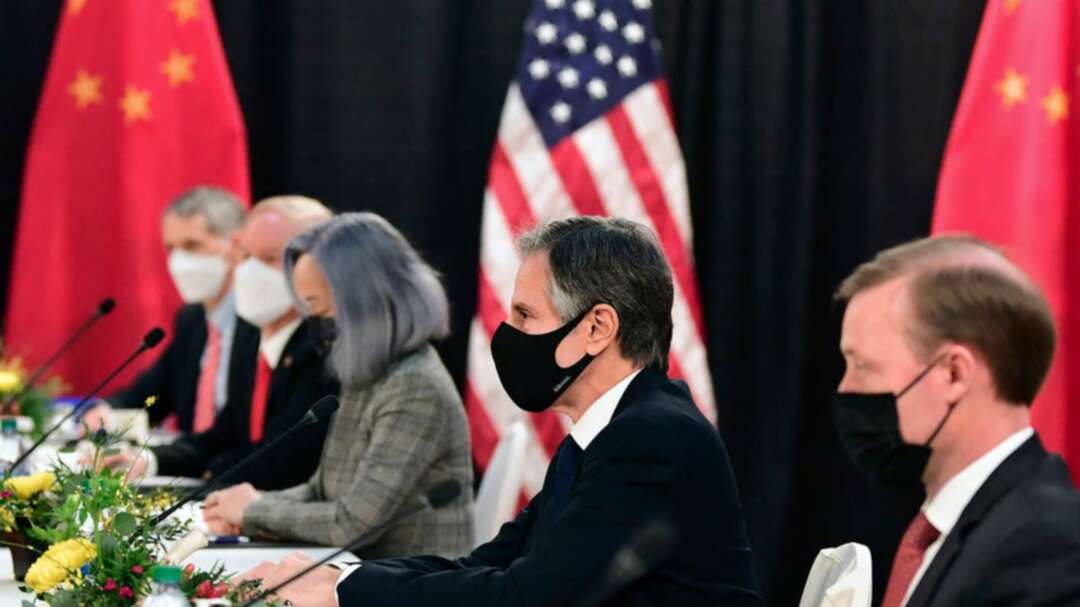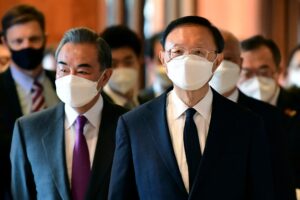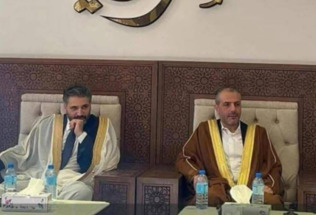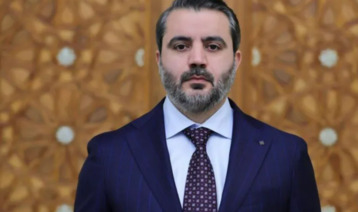-
US, China spar in first face-to-face meeting under Biden

Top US and Chinese officials offered sharply different views of each other and the world as the two sides met face-to-face for the first time since President Joe Biden took office.
In unusually pointed public remarks for a staid diplomatic meeting, Secretary of State Antony Blinken and Chinese Communist Party foreign affairs chief Yang Jiechi took aim at each other’s country’s policies on Thursday at the start of two days of talks in Alaska. The contentious tone of their public comments suggested the private discussions would be even more rocky.
The meetings in Anchorage were a new test in increasingly troubled relations between the two countries, which are at odds over a range of issues from trade to human rights in Tibet, Hong Kong and China’s western Xinjiang region, as well as over Taiwan, China’s assertiveness in the South China Sea and the coronavirus pandemic.
Blinken said the Biden administration is united with its allies in pushing back against China’s increasing authoritarianism and assertiveness at home and abroad. Yang then unloaded a list of Chinese complaints about the US and accused Washington of hypocrisy for criticizing Beijing on human rights and other issues.
“Each of these actions threaten the rules-based order that maintains global stability,” Blinken said of China’s actions in Xinjiang, Hong Kong and Taiwan, and of cyber attacks on the US and economic coercion against US allies. “That’s why they’re not merely internal matters, and why we feel an obligation to raise these issues here today.”
National security adviser Jake Sullivan amplified the criticism, saying China has undertaken an “assault on basic values.”
“We do not seek conflict but we welcome stiff competition,” he said.
Yang responded angrily by demanding the US stop pushing its own version of democracy at a time when the US itself has been roiled by domestic discontent. He also accused the US of failing to deal with its own human rights problems and took issue with what he said was “condescension” from Blinken, Sullivan and other US officials.
 Yang Jiechi (R), director of the Central Foreign Affairs Commission Office for China and Wang Yi (L), China's Foreign Minister arrive for a meeting with US counterparts at the opening session of US-China talks at the Captain Cook Hotel in Anchorage, Alaska on March 18, 2021. (File photo: AFP)
Yang Jiechi (R), director of the Central Foreign Affairs Commission Office for China and Wang Yi (L), China's Foreign Minister arrive for a meeting with US counterparts at the opening session of US-China talks at the Captain Cook Hotel in Anchorage, Alaska on March 18, 2021. (File photo: AFP)“We believe that it is important for the US to change its own image and to stop advancing its own democracy in the rest of the world,” he said. “Many people within the US actually have little confidence in the democracy of the US.”
“China will not accept unwarranted accusations from the US side,” he said, adding that recent developments had plunged relations “into a period of unprecedented difficulty” that “has damaged the interests of our two peoples.”
‘There is no way to strangle China,” he said.
Blinken appeared to be annoyed by the tenor and length of the comments, which went on for more than 15 minutes. He said his impressions from speaking with world leaders and on his just-concluded trip to Japan and South Korea were entirely different from the Chinese position.
“I’m hearing deep satisfaction that the US is back, that we’re reengaged,” Blinken retorted. “I’m also hearing deep concern about some of the actions your government is taking.”
Underscoring the animosity, the State Department blasted the Chinese delegation for violating an agreed upon two-minute time limit for opening statements and suggested it “seem(ed) to have arrived intent on grandstanding, focused on public theatrics and dramatics over substance.”
“America’s approach will be undergirded by confidence in our dealing with Beijing — which we are doing from a position of strength — even as we have the humility to know that we are a country eternally striving to become a more perfect union,” it said.
US-China ties have been torn for years, and the Biden administration has yet to signal whether it’s ready or willing to back away from the hard-line stances taken under Donald Trump.
Just a day before the meeting, Blinken had announced new sanctions over Beijing’s crackdown on pro-democracy advocates in Hong Kong. In response, China stepped up its rhetoric opposing US interference in domestic affairs and complained directly about it.
“Is this a decision made by the US to try to gain some advantage in dealing with China?” State Councilor Wang Yi asked. “Certainly this is miscalculated and only reflects the vulnerability and weakness inside the US and it will not shake China’s position or resolve on those issues.”
Trump had taken pride in forging what he saw as a strong relationship with Chinese leader Xi Jinping. But the relationship disintegrated after the coronavirus pandemic spread from the Wuhan province across the globe and unleashed a public health and economic disaster.
source: The Associated Press
Image source: AFP
Levant
You May Also Like
Popular Posts
Caricature
BENEFIT Sponsors Gulf Uni...
- April 17, 2025
BENEFIT, the Kingdom’s innovator and leading company in Fintech and electronic financial transactions service, has announced its sponsorship of the “Innovation and Sustainable Technology Solutions Competition (GU - IST Solutions), hosted by Gulf University at its main campus.
This strategic sponsorship reflects BENEFIT’s active role in advancing technological innovation and fostering sustainable solutions to future challenges. It also seeks to empower Bahraini youth by enhancing their skills, capabilities, and competitiveness in innovation and solution development—contributing meaningfully to the broader goals of sustainable development across all sectors.
As part of BENEFIT’s active involvement in the competition, the company has announced that Hanan Abdulla Hasan, Senior Manager of Public Relations and Communication, will serve on the competition’s supervisory committee. Her upcoming participation reflects BENEFIT’s forward-looking commitment to championing academic and professional excellence.
Commenting on the occasion, Hanan Abdulla Hasan, Senior Manager of Public Relations and Communication at BENEFIT, said, “We are privileged to support this pioneering initiative, which aligns seamlessly with BENEFIT’s enduring commitment to fostering innovation and nurturing the potential of Bahrain’s youth. Our participation is rooted in a deep sense of social responsibility and a firm belief in the pivotal role of innovation in shaping a sustainable future. Through such platforms, we seek to empower the next generation with the knowledge, skills, and foresight required to develop impactful solutions that address future challenges, in line with the United Nations Sustainable Development Goals 2030.”
Dr. Aseel Al Ayash Dean of the College of Engineering in Gulf University commented, “We extend our sincere gratitude to BENEFIT for their generous sponsorship and support of the Innovation and Sustainable Technology Solutions Competition. This contribution plays an instrumental role in helping us achieve the strategic goals of this initiative, namely, cultivating a culture of innovation and sustainability, encouraging efforts that address the imperatives of sustainable development, and enhancing the practical and professional capabilities of our students and participants.”
The event will bring together a diverse spectrum of participants, including secondary school students, university undergraduates, engineers, industry professionals, entrepreneurs, academic researchers, and subject matter experts representing a wide range of disciplines.
The competition seeks to inspire participants to develop and present innovative, sustainable technologies aimed at addressing pressing environmental, social, and economic challenges. It encourages the formulation of business models that integrate advanced technological solutions with core principles of sustainability. Moreover, it serves as a platform for emerging leaders, entrepreneurs, and innovators to contribute to the advancement of the Sustainable Development Goals, promote the ethos of responsible technology, and demonstrate its transformative potential across various sectors.
Attendees will have the opportunity to view a series of project presentations submitted by participants, covering diverse areas such as eco-friendly product design, smart and sustainable innovations, renewable energy technologies, water conservation and management, waste minimisation and recycling, green architectural solutions, and sustainable transportation systems. Outstanding projects will be formally recognised and awarded at the conclusion of the event.
opinion
Report
ads
Newsletter
Subscribe to our mailing list to get the new updates!






















